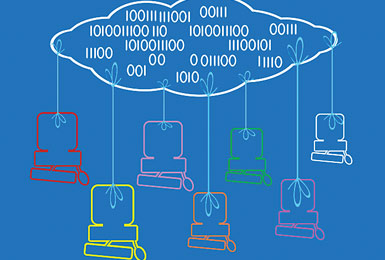Market Report: IT and Digital Arts Revolutionizing Tech, Attracting Investment
Information technology (IT) and digital arts are continuing to push the envelope with cloud computing advances and aggressive investment strategies.
March 2011

Based on the information KPMG has received from U.S technology executives, Gary Matuszak, KPMG global chair for the Information, Communications and Entertainment practice, is optimistic. In KPMG's most recent survey of tech executives, the firm found that business leaders expect significant improvement in 2011. "Almost nine out of 10 executives said they expect business conditions in the technology sector to improve in 2011, including stronger revenue," Matuszak says. "About half the respondents believe the growth rate for both cloud computing and mobile applications could exceed 10 percent over the next two years."
The Cloud Computing Revolution
Cloud computing* represents a shift in the relationship between the providers and consumers of information-technology (IT)-based solutions. According to Gartner, a global information technology research and advisory firm, the cloud represents a new opportunity to shape the relationship between those who use IT services and those who sell them. Gartner predicts worldwide cloud services revenue - including public and private services - will reach $148.8 billion in 2014. What's more, the firm predicts all Global 2000 companies will use public cloud services by 2016.
The forecast for cloud computing across key U.S. cities calls for new lines of business, more need for IT services, and potential job growth, according to a January 2011 survey from Microsoft. IT decision-makers in financial services, manufacturing, professional services, and the retail and hospitality sectors see cloud computing as an opportunity to grow their business, drive innovation and strategy, and efficiently collaborate across geographies.
Which are the most "cloud-friendly" cities? Boston; New York; Dallas; San Francisco; Atlanta; Washington, D.C.; Philadelphia; Los Angeles/ Orange County; Chicago; and Detroit. Although Detroit ranks near the bottom of Microsoft's top-10 rankings for cloud-friendly cities for large organizations, nearly half of IT decision-makers in Detroit, Michigan, see the cloud as an avenue for creating business advancements, saying the cloud is an engine of innovation.
Investing in IT
So it seems Michigan isn't just betting on cars any more. The Venture Michigan II Fund has $120 million to invest in early-stage Michigan companies in high-growth, emerging industries such as information technology.
And other Midwest states are showing growth in the IT sector. Missouri is carving out an information technology cluster that includes the likes of DST Systems, Cerner Corp., and Unisys. Evanston, Illinois, is making a name for itself with the Technology Innovation Center (TIC), which recently ranked on Forbes' list of "10 technology incubators that are changing the world." The TIC is home to 38 companies and has helped 350 tech firms in the last 24 years.
Meanwhile, Dayton, Ohio, is making inroads with the world's first RFID (radio frequency identification) technology incubator for communications equipment. The Dayton RFID Convergence Center is spurring the advancement of commercial application of RFID and related technologies common in many products.
On the software front, San Diego is a traditional cluster, but Portland is gaining momentum. It's not a new cluster - Microsoft is in the region - but software startups are finding a welcome home there. Mayor Sam Adams recently unveiled a plan to grow the region's software industry.
"This area is home to some of the most innovative and exciting software companies in the industry," says Matt Nees, president of the Software Association of Oregon (SAO). "We are now seeing a rise in the software development component of the high-tech sector and.Portland [will] greatly benefit from this growth."
Most important, skyrocketing demand for wireless data is a key growth driver for the ICT industry in 2011 and beyond, according to the Telecommunications Industry Association. In fact, President Obama recently launched the National Wireless Initiative to provide 98 percent of Americans access to next-generation wireless services.
Project Announcements
Samsung Electronics Expands Taylor, Texas, Chip-Manufacturing Operations
04/18/2024
Spectrum Advanced Manufacturing Technologies Expands Colorado Springs, Colorado, Operations
04/11/2024
South Korea-Based SK Hynix Plans West Lafayette, Indiana, Chip Fabrication-Research Operations
04/08/2024
PrizePicks Establishes Atlanta, Georgia, Headquarters
04/05/2024
BBP Expands Baton Rouge, Louisiana, Manufacturing-Headquarters Operations
04/04/2024
Duotech Services Expands Franklin, North Carolina, Operations
03/28/2024
Most Read
-
2023's Leading Metro Locations: Hotspots of Economic Growth
Q4 2023
-
2023 Top States for Doing Business Meet the Needs of Site Selectors
Q3 2023
-
38th Annual Corporate Survey: Are Unrealized Predictions of an Economic Slump Leading Small to Mid-Size Companies to Put Off Expansion Plans?
Q1 2024
-
Manufacturing Momentum Is Building
Q1 2024
-
Making Hybrid More Human in 2024
Q1 2024
-
20th Annual Consultants Survey: Clients Prioritize Access to Skilled Labor, Responsive State & Local Government
Q1 2024
-
Public-Private Partnerships Incentivize Industrial Development
Q1 2024



